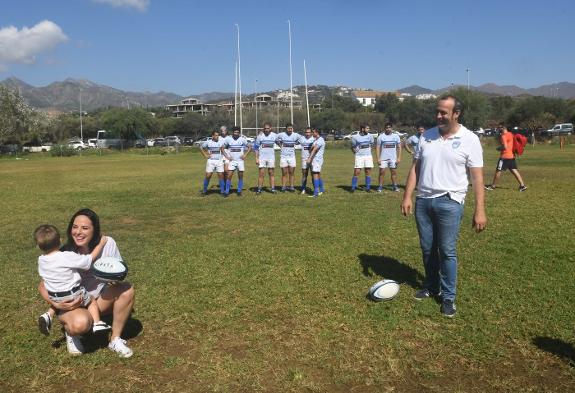

Sections
Highlight

PABLO COLLANTES
Monday, 16 October 2017, 12:00
Compartir
Even when he was born, there were small reddish marks all over baby Pablo's body. Doctors in London, where he was born, appeared unable to give a reliable diagnosis of what in less than seven weeks became mastocitosis, a group of rare illnesses which affect one person in two thousand.
uOne in two thousand. In Spain about 1,300 people suffer from mastocitosis, which can affect adults and children.
uPalliative treatment. At present there is no cure for this illness, which is characterised by a variety of symptoms.
uExperts. The Institute of Studies into Mastocitosis is in Toledo, and is the only specialist centre in the country.
Pablo's parents, who now live in Marbella, want to raise awareness of what it is like to live with this condition, and El Trocadero Marbella Rugby Club has just donated the proceeds from its most recent match towards further research.
They were desperate to find out what was wrong with their baby, because nobody seemed to know, but finally a British doctor suggested that Pablo could be suffering from mastocitosis. The couple had never heard of it, so they began looking on the Internet for information.
We were devastated, and we wanted to find out what the best treatment would be for him, says Silvia Almagro, the little boy's mother.
In London they advised me to stop breastfeeding him and they gave me a long list of things he shouldn't eat, because they could make him worse. At that point, we realised that we really needed to know more about his condition, she explains.
It was then that they came across Dr Luis Escribano, coordinator of the Institute of Mastocitosis Studies of Castilla La Mancha, which is in Toledo.
He was our salvation. I emailed him about our case and, even though he told me he was now retired, we decided we should go to Toledo straight away, she says.
Once there, Silvia and her husband felt slightly more relieved. At the centre they were given full information about every aspect of the illness and since then the doctors at the Institute have been monitoring Pablo's treatment and carrying out occasional check-ups.
The first thing they told us was that Pablo would be able to live a normal life, says Silvia. That helped to reassure us.
Symptoms
Mastocitosis, as its name suggests, is characterised by an increase in mast cells, a type of cell which originates in the bone marrow. The symptoms can vary, from purplish marks on the skin to itching, blisters, abdominal pain and many others. It can occur in children and adults and the skin is the principal organ affected, although there can also be damage to bone marrow, liver and bones.
We didn't know any of that at first. Now we've become experts, says Silvia, laughing.
In Pablo's case, he is particularly susceptible to scratches, which can cause him great irritation, so his parents have to do everything they can to stop him scratching himself. I have spent entire nights with him, trying to stop him scratching in his sleep and injuring himself. That is the most difficult part of his illness at present, says Silvia.
Heat is another problem for patients with mastocitosis. High temperatures really affect him. We can hardly go out of the house in the summer, she explains. However, Pablo was able to enjoy a few days at the beach this year. Little by little we are seeing some slight improvement and I hope that next year we might be able to go on holiday, says Silvia.
Despite the occasional setback, Pablo's family say they owe a great deal to the doctors in Toledo. We will always be grateful to them. They have supported us ever since we first saw them. Anything that happens to Pablo, any questions we may have, we just send them an email and we get an immediate response, she says.
At present there is no cure for this illness, which is suffered by over 1,300 people in Spain. The medical treatment Pablo receives, under the health service, is palliative and helps him to feel better every day.
Normally, when the illness affects babies, you see a great improvement after the first three years. Pablo was two in July, says Silvia.
At his last check-up in Toledo, the specialists increased his medication and he is currently taking 12 doses of different medicines a day.
As soon as they knew what Pablo's illness was, Silvia joined the Spanish Association of Mastocitosis and Related Illnesses, and she is now its Andalusian representative.
We give support to anybody who discovers that they have the illness. I would have liked someone to calm my fears and tell me what had happened in their case, and that is exactly what the association aims to do, she explains.
As well as assisting affected families, the association is raising funds for more research into the condition. We receive very little support from the authorities, so we have to try to support the research ourselves, she says.
They are also trying to persuade the Ministry of Health and regional health authorities to recognise mastocitosis as a chronic illness, so that patients can benefit from medication, visits and other social assistance.
Every day somebody else could find out that they, or their child, is suffering from mastocitosis. We need the resources to enable us to help people, says Silvia.
Publicidad
Publicidad
Publicidad
Publicidad
Reporta un error en esta noticia
Necesitas ser suscriptor para poder votar.